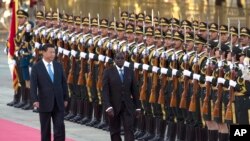Zimbabwe is this week hosting high level business delegations from China and Britain raising the potential for an economic revival after years of turmoil and isolation by the West.
But the controversial indigenization law is said to be still causing serious concern among potential investors.
A Chinese government delegation led by the Beijing state councillor Yang Jiechi on Monday met President Robert Mugabe and later his senior cabinet officials to discuss the implementation of the business deals the two countries penned last year.
Mr. Mugabe met Jiechi at State House on the second leg of the three African countries tour which began ib Algeria and Uganda Tuesday.
Another delegation from Britain is also expected this week and government sources say in April a Belgian delegation will be in the capital, Harare.
Zimbabwe requires at least US$27 billion to fund the Zimbabwe Agenda for Sustainable Socio-Economic Transformation (ZIMASSET), with the bulk of the money earmarked for infrastructural projects.
But Harare has struggled to attract foreign direct investment, which is pivotal in addressing the economic crisis.
Zimbabwe National Chamber of Commerce deputy president Davison Norupiri told VOA Studio 7 the foreign delegations are an important step in economic revival.
The European Union is also expected this week to resume direct aid to the Zimbabwe government after a 13 year hiatus.
The 28-member EU bloc is expected to sign a $266 million national indicative progamme with Harare to fund a number of projects that include health and the constitutional alignment.
The EU in 2002 suspended direct funding to the Harare government accusing it of electoral fraud and human rights abuses. But Harare says the EU imposed sanctions on the country after it embarked on its land reform programme by seizing land from the minority whites and giving it to the majority blacks.
Last year, the EU suspended sanctions on eight of Zimbabwe's most powerful military and political figures but kept them on President Robert Mugabe and his wife, Grace, in a cautious easing of its policy. The sanctions on Mr Mugabe and his wife Grace, will be reviewed byt the EU February 20.





